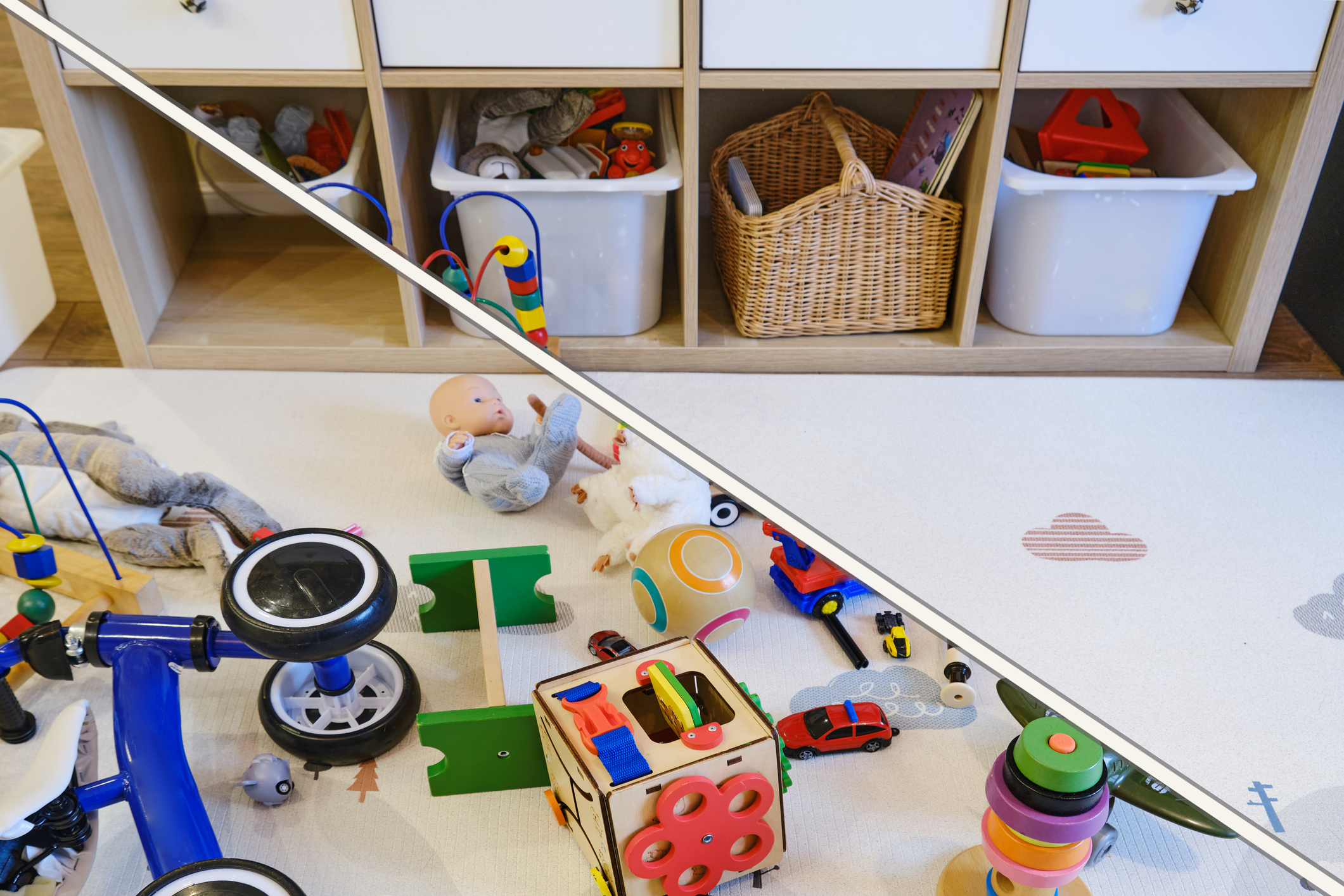
I don’t know about you, but I have two inner voices that talk to me from time to time. One is kind, encouraging, and will always let me know when I’ve done a good job. I call her Delores. If you go to my website, you’ll see Delores. She’s the one with the helpful organizing tips. My other inner voice is mean to me. It criticizes, judges me negatively, and makes me feel like I can’t do anything right. I call her Cruella DeVille. Recently, I attended a virtual conference sponsored by the Institute for Challenging Disorganization. There were 3 fabulous presentations on ADHD. Dr. Sharon Saline gave the second presentation. Part of her discussion focused on how to use your positive inner voice to help you accomplish your goals. Let’s take that concept and apply it to using your positive inner voice to help as you are clearing the clutter.
How does your inner voice impact clearing the clutter?
As we go about doing our daily chores or simply living our lives in our homes we must regularly deal with our belongings. We get them out, put them down, we put them away, or we step away from them to attend to them later. Uh, oh. There’s that word ‘later’. When we let ourselves put off dealing with something until a later unspecified time there’s a likelihood that ‘thing’ will become clutter.
It will sit there on a tabletop or on a chair waiting for us to notice and attend to it. Maybe other out of place belongings will join it, maybe our positive inner voice will tell us to get to work.
When Delores talks to me about decluttering, she encourages me. She says it won’t take very long and I’ll feel good about taking this decluttering task off my to-do list.
If Cruella DeVille steps in, she may tell me to walk away from the pile because it will take too long to attend to. Plus, she’ll tell me that I don’t know what to do with it so why bother trying.
To be honest, I listen to Delores more often than not.
Recognizing how different inner voices contribute to clutter
I have a client whose inner voice is very mean. It tells her all the time that she is a bad person for letting clutter accumulate. This mean, inner voice impacts my client’s ability to declutter by telling her that no matter what she does, it won’t be enough because there is so much to declutter.
My client hasn’t found her inner, positive voice yet. All she currently hears is the negative chatter coming from this mean inner voice.
Harnessing Your Inner Voice for Clearing the Clutter
I am working with this client to set SMART decluttering goals. SMART stand for: Specific, Measurable, Actionable, Realistic, and Time bound. We are doing this, setting SMART goals for each area of her home.
Being realistic in her expectations allows this client to take positive steps forward and to activate a kind and generous way of speaking to herself. This in turn helps to quiet that negative inner voice.
Techniques for Engaging Your Inner Voice in Decluttering
Here are 3 techniques to engage your inner voice in decluttering:
Mindfulness: pay attention to the words you use when talking to yourself about clearing the clutter.
Journaling: Take time to journal about the physical and mental clutter in your life. Kim Tremblay has a journal with prompts to help you start writing about clearing the clutter.
Visualization: Think about how you want the space to look and feel when you have finished decluttering. Hold this vision in your mind when you are working to clear the clutter.
Listening to Your Inner Voice in Decision-Making During Decluttering
Dealing with your belongings requires you to make lots of decisions. Your inner voice can help you. Trust your initial reactions to something. If, when you look at the object, you think ‘what am I going to do with that!’ it’s time to let it go.
Perhaps you’re saying to yourself that you don’t know where to put it so that you remember to use it. Then, it may be time to do a little reorganizing of the space (letting something else go to make room for this thing).
If you’re unsure how to do that, get help from a professional organizer like me.
Maybe you have a negative voice talking to you (like my client does) and this voice is telling you that the easiest thing to do is nothing. This is true. Doing nothing is an easy way to deal with clutter in the short term. The problem is that clutter accumulates.
My client refers to the SMART goals she created for clearing clutter in all the spaces in her home. When she gets stuck, she remembers the goal. This helps her to make decisions about her things.
Strengthening Your Inner Voice for Continued Decluttering Success
The more you listen to the positive self-talk chatter in your head the stronger it gets. Dr. Saline told the audience that she talks to the negative voice she hears. She tells it, it’s OK. She’s got this. The negative thoughts can just go sit in the corner and be quiet.
Every time you finish clearing the clutter from a space (no matter how small) celebrate! Reward yourself with a small treat. Consistent decluttering efforts will yield positive results. The more positive results you get, the easier it is to continue.
Conclusion
Use the positive inner voice you hear to boost your confidence as you go about clearing the clutter. This inner voice will give you grace to backslide and let clutter accumulate from time to time. Remember to use SMART goals for each area of your home. Employ mindfulness, journaling, and visualization techniques to help you. We all have a negative voice. Give it a name and let it know you don’t like the way it speaks to you.
Clearing the clutter in our homes is an on-going journey. If this is one of your goals, I would be honored to work with you to create personalized SMART decluttering goals.
Diane N. Quintana is a Certified Professional Organizer® ,a Certified Professional Organizer in Chronic Disorganization®, Master Trainer and owner of DNQ Solutions, LLC and co-owner of Release●Repurpose●Reorganize, LLC based in Atlanta, Georgia. She specializes in residential and home-office organizing and in working with people affected by ADHD, Hoarding, and chronic disorganization.
Frequently Asked Questions (FAQs)
What role does our inner voice play in the decluttering process?
Our inner voice influences our mindset, motivation, and decision-making during decluttering. It can either support or hinder our efforts by shaping our attitudes towards possessions and clutter.
How can I distinguish between helpful and unhelpful inner dialogue when decluttering?
Helpful inner dialogue is supportive, encouraging, and aligned with your decluttering goals. Unhelpful inner dialogue often involves self-doubt, procrastination, or negative self-talk. Learning to recognize and challenge unhelpful thoughts is key.
What strategies can I use to quiet negative self-talk during decluttering?
Techniques such as mindfulness and positive affirmations can help quiet negative self-talk and replace it with more positive and constructive inner dialogue.
I often feel overwhelmed when decluttering. How can I use my inner voice to cope with this?
Using your inner voice to break down tasks into smaller, manageable steps, practicing kindness, giving yourself grace, and focusing on progress rather than perfection can help alleviate feelings of overwhelm during decluttering.
I’m not sure where to start with decluttering. How can I use my inner voice to guide me?
Your positive inner voice can help you set decluttering intentions, prioritize areas to tackle, and make decisions about what to keep or let go of. Trusting your intuition and staying connected to your goals can provide valuable guidance.
Reach out to me for help creating personalized strategies for decluttering your home. You can email me at: dnqsolutions@gmail.com to schedule a free 30-minute phone consultation.


It’s so important to distinguish those two parts of ourselves (and sometimes, there’s even a third or fourth), and be hospitable to each side of the equation. I also loved Dr. Saline’s way of speaking to the “Cruella” side – not chastising her, but letting her know everything is going to be ok. Journaling is always my go-to for working with those thoughts, and in fact I’m realizing as I read your post I need to go have a chat with some of those other parts of me. Thanks for sharing this information to a wider audience!
Yes, I do have a negative voice, but now you gave me an idea to name it. I’m well organized, the inner voice if is geared more towards the things that need to be done and put away before I go to bed for example. The idea of waking up to a messy kitchen is not an option.
Great blog Diane.
Thank you, Janet. I think we all have a negative voice – it just depends on how loud it is and if the positive voice is louder.
For the most part, I’m lucky in that my “negative” inner voice is kind to me; it doesn’t say *I’m* doing anything wrong. Rather, Princess (as I’m calling her) bemoans the lack of maids and butlers and valets to do the household work. Perhaps because I’m eager to do the organizing, it’s just the labor (vacuuming, dusting, mopping the floors) that Princess sees as not worth my time. I can’t hate Princess (because, I mean, she’s right — shouldn’t we all have “people” or at least robots to do the household stuff by now?), but I do sometimes have to give her a patient smile and do just as you advise, and say, “I’ve got this.” The truth is, there’s a lot of adulting that even at my ripe old age, I resent having to do. But if I apply the same positive self-talk I enjoy while organizing and decluttering (tasks I love), to the housework tasks I despise, perhaps someday Princess will enjoy living among the townsfolk? ;-)
But seriously, I love that you’ve conveyed the insight you got from Dr. Saline’s presentation, especially regarding mindfulness, journaling, and visualization. Maybe Princess needs to visualize anthropomorphic mice and birds helping me with the housework? ;-)
I love that you named your voice ‘Princess’. Maybe a little visualization is all Princess needs to get moving on those household chores! Thank you, Julie for commenting.
Ah, negative voices. We all have them. Being kind to yourself is the best way to work past anything. Negative voices stop us from moving forward. Thank you for talking about this topic. People need to hear it. =)
Thank you, Sabrina! Do you have a name for your negative voice?
The ICD Virtual Conference was fantastic! I love how you took a deep dive into Dr. Sharon Saline’s discussion about the inner voices- naming and working with them. I love how the names you gave yours and the ways you suggested working with them—Quieting Cruella and magnifying Dolores.
I have yet to name my “voices,” but they DO exist. It’s helpful to think of them as people—some we want to spend more time with, and some we don’t. I prefer being with people who lift me rather than tear me down. So why would I want to give that negative voice a lot of air time?
Your suggestions about supporting a more positive inner life are excellent. Positive affirmations, mindfulness, setting clear intentions, journaling, and quieting the negative self-talk all work well. I love this post! Thank you.
Thank you, Linda. Like you – I give more power and more airtime to the positive voice of Delores. My mean and nasty Cruella voice appears but is drowned out by Sweet Delores. It makes me so happy to know you liked this post!
I’m pretty organized, so my negative inner voice rarely shows up in that area of my life, but I’m very familiar with it from other areas. I will try and remember your three techniques (mindfulness, journaling and visualization) when I find myself paying too much attention to it.
Thank you, Janet
Very good advice. I had almost forgotten about visualization. I use visualization not only to have a vision of what the space should look like but also to visualize myself doing the task.
When I did competitive ballroom dancing, I would often visualize myself on the floor performing the moves. Now, I use this same technique to visualize myself doing a task or routine before I actually do it. Once I’ve mentally gone through the steps, the whole procedure seems so much easier.
I love that you visualize yourself taking the steps! Thank you, Jonda
That inner voice can really do a number on us, right? It’s hard to get away from, because everywhere I go, there it is!
I love the way you talk about ways to silence that negative voice and nurture the positive one. The world is plenty busy tearing us down, we don’t need to add to that by talking down to ourselves. Yet, if this is a longstanding habit, like any habit, it can be hard to change.
Having someone nearby who can “listen” to what that voice is saying, and then provide a different narrative, can be so helpful. Journaling is also such a terrific idea because it gets those “lies” out of head and into the light of the day, where we can more easily see them for what they are.
I love your thought about journaling. I journal everyday and I understand what you are saying. Thank you, Seana!